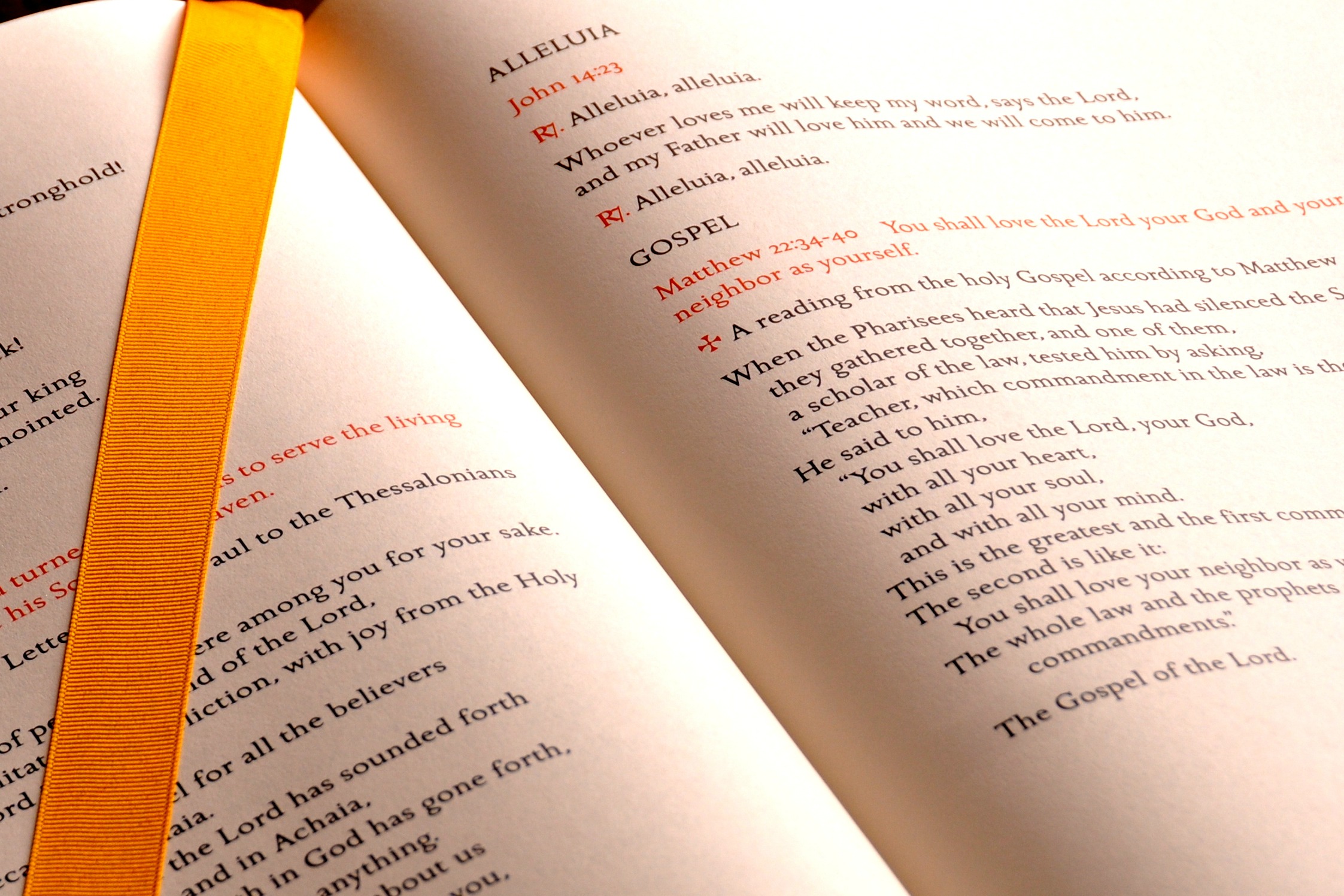Remember.
Sometimes, it takes the opening movements of the mass for my mind and heart catch up with my body. As I sing the opening song, sign myself with the Cross of Christ, and join the presider and community in prayer, I take a few deep breaths as I allow the rhythm of the liturgy to wash over me.
Sitting down in the pew for the Liturgy of the Word, I enter into the practice of listening – to open up my ears, my heart, my soul – to receive the Word of God. Sometimes it takes more work to quiet the disjointed thoughts running through my mind and allow myself to be fully present to the presence of Christ in the Scriptures being proclaimed. Yet cultivating this practice of listening is essential for as we participate in the Liturgy of the Word, we encounter the story of God’s mercy and love proclaimed for us both in this moment and throughout all of salvation history.
Life today can easily become fragmented and isolated. We sit together with family and friends, yet focused not on each other, but immersed in the world of our own phones. The political rhetoric filling our airwaves forces people to the extremes. Violence tears our world apart and disturbs our sense of peace. We feel dragged in many directions by the expectations of family, co-workers, friends, even ourselves. Our community, our families, our very lives become dis-membered.
The stories we hear each day – from television shows, advertisements, Facebook and Instagram posts – contribute to this fragmentation by portraying a false sense of what it means to be a woman or a man. Enticing us with unobtainable goals for popularity and “likes,” these stories constantly cultivate a desire for the next thing that will make us whole – the next experience, the newest tech, even the next relationship. These stories shape us in ways that dis-member us and erode our understanding of who we are created to be.
In the Book of Ezekiel, God takes Ezekiel to the Valley of the Dry Bones, which is filled with scattered and bleached human bones, dis-membered bodies.
The hand of the LORD came upon me, and he led me out in the spirit of the LORD and set me in the center of the broad valley. It was filled with bones. He made me walk among them in every direction. So many lay on the surface of the valley! How dry they were! He asked me: Son of man, can these bones come back to life? “Lord GOD,” I answered, “you alone know that.” Then he said to me: Prophesy over these bones, and say to them: Dry bones, hear the word of the LORD! Thus says the Lord GOD to these bones: Listen! I will make breath enter you so you may come to life. I will put sinews on you, make flesh grow over you, cover you with skin, and put breath into you so you may come to life. Then you shall know that I am the LORD (Ezekiel 37:1-6).
In the time of Ezekiel the people of Israel had been scattered into exile in a foreign land. The nation had been “dis-membered” — torn apart — like the valley of the dry bones. As the breath of God blows over the dry bones they are reconnected and brought back to life. The bodies are “re-membered” and life is restored to wholeness.
When we participate in the Liturgy of the Word we remember God’s mercy throughout history, God’s love for us – God’s love for me. By remembering, we return to wholeness by reminding ourselves of who we are, who God created us to be and most importantly who God is. We listen to the stories of God’s work in the world – from the first moments of creation, establishing the covenant with Abraham, leading the Israelites out of Egypt, and through the time of kings and prophets. As humanity struggles with sin, God listens intently to our cries and draws near, creating new space for life and blessing. In the Incarnation God becomes human, one of us. And through the paschal mystery – the life, death and resurrection of Christ – our lives are taken up into God’s life. This is what we remember.
In the Liturgy of the Word, God speaks to his people and nourishes their spirit; Christ is present through his Word. We remember that the same God who has been acting throughout history is intimately concerned with each one of us. “He has come to the help of his servant Israel for he has remembered his promise of mercy, the promise he made to our fathers, to Abraham and his children for ever” (Luke 1:54-55). Remembering God’s past acts of love and mercy nourishes our faith and capacitates us to discern God’s mercy in the present moment. Through the Word, we are re-membered.
The word of God proclaimed in the celebration of God's mysteries does not only address present conditions but looks back to past events and forward to what is yet to come. Thus God's word shows us what we should hope for with such a longing that in this changing world our hearts will be set on the place where our true joys lie (Introduction to the Lectionary, 7).
When the Christian community gathers in faithful response to Christ's command at the Last Supper, "do this in remembrance of me" the Church's ritual action of remembering our salvation in Christ not only inspires, but demands action in the world. The Greek word anamnesis, refers to the fact that in the celebration of the liturgy we not just remember, but make present, the passion of Christ – the life, death and resurrection poured out in love for the world and for each one of us.
We remember in order to live a life shaped by the vision of a future that fulfills the promises of the past. God speaks to us through the scriptures and nourishes us through the Body and Blood of Christ, then sends us forth to pour ourselves out in love - showing us how we put the faith we have received into action.



